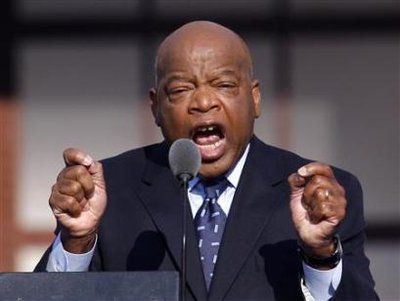by Janice L. Mathis, Esq.
Executive Director,
National Council of Negro Women, Inc.
Congressman Lewis was famous for saying, “get into trouble get into good trouble.” Some of the best trouble you can get into over the next 48 hours is to VOTE. The highest percentage Black voter turnout on record was the 2012 election. Black folk and others in the Obama Coalition decided that the incumbent President deserved a second term in office. And so we voted in historically high proportions. The challenge became personal. You tell me no and I am going to show you how.
At the funeral for Congressman John Lewis, President Obama said, “…there are those in power who are doing their darnedest to discourage people from voting, by closing polling locations, and targeting minorities and students with restrictive I.D. laws, and attacking our voting right with surgical precision, even undermining the postal service to an election that’s going to be dependent on mail-in ballot so people don’t get sick.”
Just like we did when some folk wanted to deny Barack Obama a second term, we Black folk must take barriers to voting as a personal challenge. We will have a say in how this government is run and no amount of intimidation or inconvenience is going to stop us.
For years I tried (without much success) to think of ways to talk about the Voting Rights Act that were simple and clarifying. This year, there is no shortage of evidence that voter suppression is a serious obstacle to participation, especially during the Pandemic. Americans are in the midst of the second general election without the protections of the Voting Rights Act. There is little doubt that voter suppression influenced the outcome of the 2016 election and stands to play a role in 2020 as well.
The right to vote, because it is expressly mentioned in the Constitution, is considered a fundamental right, meaning that voting should be protected from interference from the government, unless the government can show a compelling reason why restrictions are necessary. Recent decisions show the Supreme Court backing away from voting as a fundamental right, applying only a simple balancing test rather than the customary strict scrutiny inquiry the courts employ to justify obstacles to voting (and to any other fundamental right). Try to imagine the uproar that would occur in reaction to a federal requirement that all guns be federally registered and insured. The right to bear arms is a fundamental right. No different than the right to vote. But they are being treated differently under the law.
We face the prospect of losing important principles like one person-one vote and majority rule if the protections of the Voting Rights Act are not restored. The 21st Century effort to discourage voting began in earnest with the decimation of the most effective civil right legislation in U.S. history, the Voting Rights Act. The 2013 decision in Shelby v. Holder made the most important parts of the Voting Rights Act – Section V pre-clearance – unenforceable. Almost immediately following Shelby v. Holder, states, which control voting procedures – began implementing or tightening – restrictions on voting. We must register our outrage at voter suppression by doing the one thing that matters most – voting like our lives depend on it.
Never mind that access to the ballot and voter suppression have been controversial and hotly contested for more than 150 years. Changing demographics and fear of loss of control have fueled a heyday of restrictions that are growing exponentially. It is not a coincidence that the restrictions on voting are aimed most squarely at so-called purple states.
So even if you are not particularly enthusiastic about voting, remember this – your voice matters. Who decides who votes? The House of Representatives passed legislation that would restore and expand the Voting rights Act. The Senate refused to give the legislation a hearing or a vote. Today it is obvious with hindsight that weakening the VRA is having dire consequences. False claims of widespread in-person and by mail voter fraud, voter roll purges, amateur signature match requirements are all designed to keep you at home. Under the pre-Shelby voting rights act, the Justice Department or a court would have to approve those changes prior to implementation – not after years of costly and time-consuming litigation. But the shield of the Voting Rights Act is gone. Restoration of the VRA is going to take action from both houses of Congress. Your vote is the key to unlock the door to the right to vote, which is the right that guarantees all other rights. Just do it.


